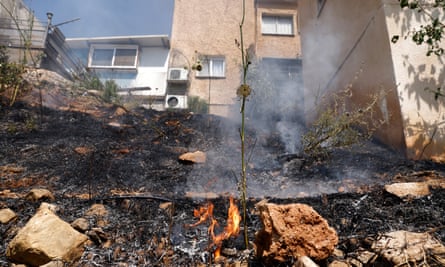Israel’s prime minister, Benjamin Netanyahu, has threatened an “extremely powerful” response to attacks by Hezbollah from Lebanon, which have escalated in recent days.
His comments, made during a visit to the city of Kiryat Shmona, in northern Israel near the border with Lebanon, came after Hezbollah launched a wave of attacks earlier this week which set substantial fires whose intensity was fanned by dry and powerful winds.
Television footage from the area of Kiryat Shmona at the beginning of the week showed firestorms engulfing nearby forests as emergency services struggled for two days to bring them under control.
The dramatic – and widely viewed – images underscored the increasingly vocal complaints from community leaders in the area bordering Lebanon, largely evacuated at the beginning of the war with Gaza, that they have been abandoned with little prospect of return. Tens of thousands of people have been displaced from their homes on both sides of the border since October.

“Anyone who thinks that they can harm us and we will sit on our hands is sorely mistaken,” said Netanyahu during his visit to Kiryat Shmona, now largely empty since Hezbollah began almost daily firing on Israel on 8 October.
“We are prepared for a very strong action in the north. In one way or another we will restore security to the north,” he added.
Netanyahu was criticised for failing to meet the mayor of Kiryat Shimona, who has been a vocal critic of what he says has been the Israeli government’s abandonment of northern communities.
On Tuesday the Israeli war cabinet had discussed the situation on the Lebanese border amid a flurry of visits by senior officials to the northern border area.
Netanyahu’s comments came a day after similar remarks by the chief of the Israel Defense Forces, Herzi Halevi, who was also visiting the north. “We’re approaching the point at which we’ll have to make a decision. The IDF is ready for an offensive,” Halevi said.
On Tuesday the European Union’s diplomatic service issued a statement flagging its increasing concern over “the ever-growing destruction and the forced displacement of civilians on both sides of the Israeli-Lebanese border”.
Calling on all actors “to exercise restraint”, it added: “Nobody stands to win from a broader regional conflict.”

While Hezbollah has indicated that it is not seeking all-out war with Israel, the status quo on both sides of the border has become increasingly untenable.
The rhetoric aimed at Hezbollah came as it was revealed that the Israeli cabinet had increased the cap on the number of army reservists it can call up by an additional 50,000 during the summer, bringing the number available to about 350,000 – close to the number called up at the beginning of the war in Gaza.
The IDF indicated that the cap on reservists had been raised due to the ongoing operations in Gaza’s southernmost city, Rafah, which have involved more additional personnel than initially planned.
Amid concerns over the scope of the border conflict, which has gradually intensified over the past eight months, Hezbollah on Monday announced it had launched a squadron of drones towards the headquarters of the Israeli military’s formation in the Galilee region.
While Hezbollah has previously launched drones at Israel during the hostilities that began in October, it marked the first time the Iran-backed group had announced firing a squadron of them.
International concern over the potential for more violence with Hezbollah was underlined by a report by Human Rights Watch on Wednesday, which accused Israel of using white phosphorus incendiary shells on residential buildings in at least five towns and villages in southern Lebanon.
Human Rights Watch said in its report that while there was no evidence of burn injuries due to white phosphorus in Lebanon, researchers had “heard accounts indicating possible respiratory damage”.
The Israeli military said it followed international law regarding munitions and the use of white phosphorus, and used the chemical only as a smokescreen, not to target civilians.
“Israel Defense Forces procedures require that such shells are not used in densely populated areas, subject to certain exceptions,” the IDF statement added.